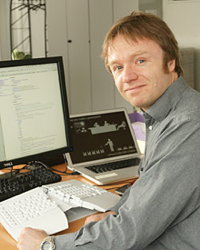Modern semiconductor fabs pose a complex scheduling problem: A fab must move an every more diversified product mix through a big hall of very expensive tools. While doing that, it should keep delivery dates, optimize throughput and minimize rejects. Worse: As many of the tools operate at the atomic level, a typical tool often breaks or operates below spec. Software can help manage this complexity, but needs to be well-structured and predictable to be truly useful. Traditional imperative and relational techniques fail to solve some of the harder problems in fab scheduling. Functional programming is more efficient for software development, but also brings additional advantages to the table:
Programming with compositional models enables systematically constructing domain models accessible to scheduling experts.
Using persistent data structures (“purely functional programming”) enables speculative simulation, which is needed to solve some complex scheduling problems.
The use of algebra and structuring devices such as monads and arrows help structure parts of a scheduling system.
This talk describes our experience developing the ALPS system (“Advanced Logistics and Production System”) together with Starview, Inc.
Michael Sperber ist CTO der Active Group GmbH. Er ist international anerkannter Experte für funktionale Programmierung und wendet sie seit 20 Jahren in Forschung, Lehre und industrieller Entwicklung an. Außerdem hat er zahlreiche Fachartikel und einige Bücher zum Thema verfasst. Michael Sperber ist Mitbegründer des Blogs funktionale-programmierung.de und Mitorganisator der BOB.
